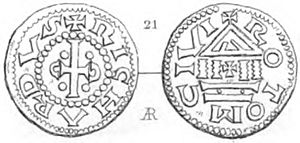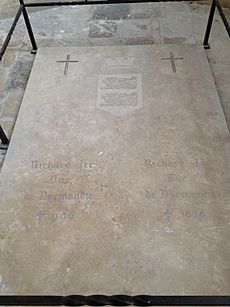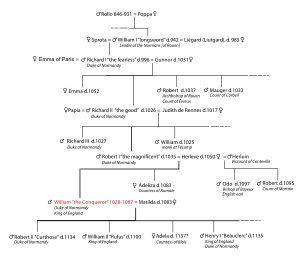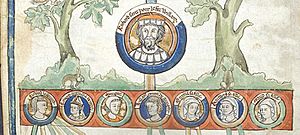Richard I of Normandy facts for kids
Quick facts for kids Richard I |
|
|---|---|
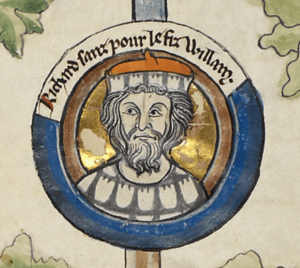 |
|
| Count of Rouen | |
| Reign | 17 December 942 – 20 November 996 |
| Predecessor | William Longsword |
| Successor | Richard II |
| Born | 28 August 932 Fécamp, Normandy, France |
| Died | 20 November 996 (aged 64) Fécamp, Normandy, France |
| Spouse | |
| Issue more... |
|
| House | House of Normandy |
| Father | William Longsword |
| Mother | Sprota |
Richard I (born August 28, 932 – died November 20, 996) was a powerful ruler. He was also known as Richard the Fearless. He was the count of Rouen from 942 until his death in 996. Some people called him a dux, which means a leader in war. Richard helped to set up or greatly expand the feudal system in Normandy. By the end of his time as ruler, most important landowners in Normandy held their lands under this system.
Contents
Richard's Early Life
Richard was born in 932. His father was William Longsword, the ruler of Normandy. His mother was Sprota, a woman from Brittany. Richard was also the grandson of the famous Rollo, who founded Normandy.
Richard's father, William, learned about his son's birth after a battle. For a few years, Richard's existence was kept a secret. When William finally met his son, he declared Richard his heir. Richard was then sent to be raised in Bayeux. He was about ten years old when his father was killed on December 17, 942. After William's death, Richard's mother, Sprota, married a wealthy miller named Esperleng. Their son, Rodulf of Ivry, was Richard's half-brother.
Richard's Time as Ruler
When Richard's father died in 942, Louis IV of France, the King of France, made young Richard the new ruler of Normandy. However, King Louis soon took Richard to Frankish lands. He placed Richard under the care of the count of Ponthieu. Later, the king took control of Normandy for himself. He even divided Normandy, giving some lands to Hugh the Great.
King Louis kept Richard closely guarded in Laon. When people heard that Richard was being held captive, his foster father, Osmond de Centville, and Bernard the Dane gathered a group of knights and peasants. They marched to the king's palace. They demanded that Richard be returned. King Louis said he was training Richard in courtly manners. He then showed Richard to the crowd and returned him. Other important people, like Bernard de Senlis and Ivo de Bellèsme, also helped free Richard.
In 946, when Richard was 14, he made alliances with Norman and Viking leaders in France. He also got help from King Harold of Denmark. They fought a battle and captured King Louis IV. Richard's allies held hostages until King Louis recognized Richard as the Duke and returned Normandy to him. Richard then agreed to work with Hugh, the Count of Paris. Hugh wanted a strong alliance with Richard. He promised his young daughter, Emma, to Richard in marriage. They married in 960.
King Louis, with the help of Arnulf I, Count of Flanders, convinced Otto I, Holy Roman Emperor to attack Richard and Hugh. But the combined armies of Otto, Arnulf, and Louis were defeated outside Rouen in 947. They fled and were completely beaten. A time of peace followed. King Louis died in 954, and 13-year-old Lothair became king. Hugh, the Count of Paris, made Richard the guardian of his 15-year-old son, Hugh Capet, in 955.
In 962, Theobald I, Count of Blois, tried to invade Rouen, which was Richard's main city. But Richard's Norman troops quickly defeated Theobald's army. They were forced to retreat before crossing the Seine river. Lothair, the king, stepped in to stop further war. He was worried that Richard's actions could cause more problems in West Francia. In 987, Hugh Capet became the King of the Franks.
For the last 30 years of his life, until his death in 996 in Fécamp, Richard focused on Normandy. He was less involved in the small wars and politics of the Franks. Instead of expanding his lands, he made Normandy strong and stable. He brought the Normans together, making his father's and grandfather's lands into a powerful region in West Francia.
Richard died naturally in Fecamp, France, on November 20, 996.
Working with Other Countries and the Church
Richard used marriages to create strong alliances. His marriage to Emma of Paris connected him to the powerful House of Capet. His second wife, Gunnor, came from a rival Viking group. This marriage helped him form an alliance with that group. Gunnor's sisters also became loyal supporters for Richard and his future rulers.
Richard's daughters made important marriage alliances. They married powerful counts nearby and even the king of England. His daughter Emma first married Æthelred the Unready, the King of England. After Æthelred died, she married Cnut the Great, who invaded England. Emma's children included Edward the Confessor and Harthacnut. These marriages created a strong link between the Duke of Normandy and the Crown of England. This link later helped William the Conqueror claim the English throne.
Richard also built strong relationships with the church. He showed great respect for religious practices. He gave back lands to the church and made sure that the large monasteries in Normandy grew and did well. His rule was a time of peace and quiet for Normandy.
Richard's Family
Richard's first marriage was in 960 to Emma. She was the daughter of Hugh the Great. They were engaged when they were very young. Emma died after March 19, 968, and they had no children.
After Emma's death, Richard met Gunnor. Gunnor became his partner, and her family became important. Gunnor was also of Viking background, partly Danish. Richard later married Gunnor to make their children officially part of the family.
Richard and Gunnor had several children:
- Richard II "the Good", who became Duke of Normandy
- Robert, who became Archbishop of Rouen and Count of Evreux
- Mauger, Count of Corbeil
- Another son
- Emma of Normandy, who married two kings of England and was the mother of two kings of England
- Maud of Normandy, who married Odo II of Blois, Count of Blois
- Hawise of Normandy, who married Geoffrey I, Duke of Brittany
Richard also had other children:
- Geoffrey, Count of Eu
- William, Count of Eu (born around 972 – died January 26, 1057 or 1058)
- Beatrice of Normandy, who was an Abbess
Some other possible children include:
- Muriella, who married Tancred de Hauteville
- Fressenda or Fredesenda (born around 995 – died around 1057), who was also a wife of Tancred de Hauteville
- Guimara (Wimarc(a)) (born around 986), who married Ansfred II "le Dane" le Goz
- Papia
See also
 In Spanish: Ricardo I de Normandía para niños
In Spanish: Ricardo I de Normandía para niños


